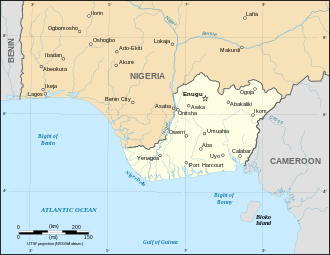WikipediaExtracts:Nigerian Civil War
Extracted from Wikipedia --
The Nigerian Civil War (6 July 1967 – 15 January 1970), also known as the Biafran War, Nigeria-Biafra War, or Biafra War, was an armed conflict fought between Nigeria and the Republic of Biafra, a secessionist state which had declared its independence from Nigeria in 1967. During the war years, Field Marshal Gowon served as the head of state of Nigeria, while Biafra was led by Lieutenant Colonel Chukwuemeka "Emeka" Odumegwu Ojukwu. The conflict emerged from political, ethnic, cultural, and religious tensions that preceded the United Kingdom's formal decolonisation of Nigeria from 1960 to 1963. Immediate causes of the war in 1966 included a military coup, a counter-coup, and anti-Igbo pogroms in the Northern Region. As a consequence of these pogroms, alongside the mass exodus of surviving Igbos from the Northern Region to the Igbo homelands in the Eastern Region, the leadership of the Eastern Region concluded that the Nigerian federal government was either unwilling or unable to guarantee them an adequate protection, therefore, the only remaining solution seemed to be to secure their compatriots' security by establishing a sovereign and independent country of Biafra.
Within a year, Nigerian government troops surrounded Biafra, while capturing coastal oil facilities and the city of Port Harcourt. In the aftermath of the Nigerian military's encirclement of the major part of Biafra, a blockade was imposed as a deliberate policy during the ensuing stalemate, which led to the mass starvation of Biafran civilians. During the 2+1⁄2 years of the war, there were approximately 100,000 overall military casualties, while between 500,000 and 2 million Biafran civilians died of starvation.
Alongside the concurrent Vietnam War, the Nigerian Civil War was one of the first wars in human history to be televised to a global audience. In mid-1968, images of malnourished and starving Biafran children saturated the mass media of Western countries. The plight of the starving Biafrans became a cause célèbre in foreign countries, enabling a significant rise in the funding and prominence of international non-governmental organisations (NGOs). Additionally, Biafra received international humanitarian aid from civilians during the Biafran airlift, an event which inspired the formation of Doctors Without Borders following the end of the war. The United Kingdom and the Soviet Union were the main supporters of the Nigerian government, while Israel supported Biafra. The United States' official position was one of neutrality, considering Nigeria as "a responsibility of Britain", but some interpret the refusal to recognise Biafra as favouring the Nigerian government.
The war highlighted challenges within pan-Africanism during the early stages of African independence from colonial rule, suggesting that the diverse nature of African people may present obstacles to achieving common unity. Additionally, it shed light on initial shortcomings within the Organization of African Unity. The war also resulted in the political marginalization of the Igbo people, as Nigeria has not had another Igbo president since the end of the war, leading some Igbo people to believe they are being unfairly punished for the war. Igbo nationalism has emerged since the end of the war, as well as various neo-Biafran secessionist groups such as the Indigenous People of Biafra and Movement for the Actualization of the Sovereign State of Biafra.
